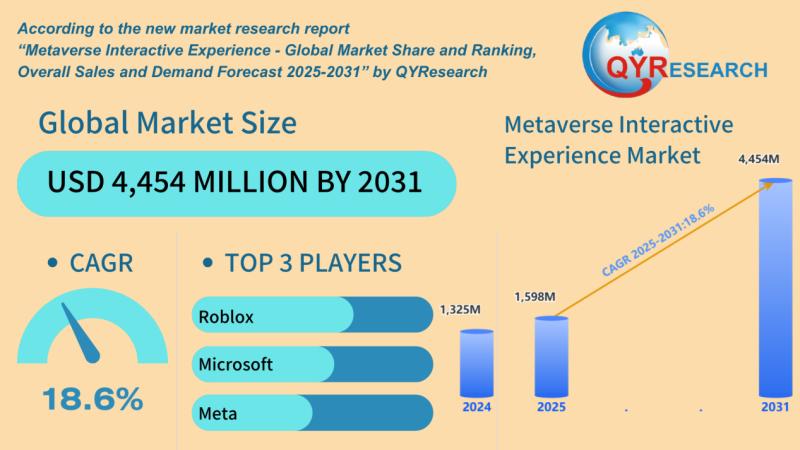Metaverse Interactive Experience Market Set to Soar 18.6% Growth!

metaverse Interactive Experience Market Set for Significant Growth
Overview of Market Projections
Recent findings from QY Research indicate that the global metaverse Interactive Experience market is expected to grow from approximately USD 1.325 billion in 2024 to USD 4.454 billion by 2031. This growth translates to a compound annual growth rate (CAGR) of 18.6% from 2025 to 2031. Since its inception, the metaverse has evolved from a theoretical concept into a dynamic digital landscape, gaining momentum since 2021.
- Overview of Market Projections
- Factors Driving Market Expansion
- Key Players in the Market
- Highlights of Leading metaverse Products
- 1. Roblox Platform
- 2. Meta Horizon Worlds
- 3. Microsoft Mesh
- 4. Unreal Engine by Epic Games
- 5. Unity metaverse SDK
- Market Segmentation and Applications
- By Type
- By Application
- Regional Market Insights
- Emerging Trends in the Industry
- Phygital Experiences
- AI Integration
- Blockchain and Decentralized Identity
- Immersive Events and VR Concerts
- Notable Brands Engaging in the metaverse
- Future Outlook
- Contact Information
- About QY Research
Factors Driving Market Expansion
As we approach 2025, the metaverse is experiencing rapid advancements, driven by increasing consumer interest, technological innovations in virtual and augmented reality, and significant investments from major tech firms. Additionally, governments worldwide are showing a keen interest in developing policies and innovation centers related to the metaverse.
Key Players in the Market
The competitive landscape of the metaverse is marked by a mix of established tech giants and emerging gaming and content creators. Notable companies shaping the market include:
- Roblox
- Microsoft
- Meta
- Epic Games
- Unity
- Tencent
- NetEase
- ByteDance
- Nexon
- Netmarble
- Lilith Games
- ZQgame
- HoYoverse
- Baidu
Meta is leading the charge in interactive experiences with its Horizon Worlds platform, which has reportedly seen user engagement grow fivefold year-over-year. In early 2025, Meta appointed former TikTok executive Shadi Nayyer to enhance collaborations with global content creators, reinforcing Horizon as a central element of its immersive strategy. Meanwhile, Microsoft is making strides in cross-platform compatibility through AI avatars and enterprise XR solutions supported by Azure.
Highlights of Leading metaverse Products
1. Roblox Platform
- Monthly Active Users: 380 million (2024)
- Daily Active Users: 79.5 million (Q2 2024)
- Developer Community: 2.5 million
- Developer Earnings: Over USD 410.7 million (H1 2024)
- User Engagement: 18.7 billion hours (Q4 2024)
2. Meta Horizon Worlds
- Development: Built using Unity, accessible on Oculus/Meta Quest and PC
- User Base: 10,000 worlds created; ~300,000 users (early 2022)
- Performance Metrics: New metrics for click-through rates and retention introduced in 2025
3. Microsoft Mesh
- Launch Date: September 7, 2023; latest version released July 2025
- Device Compatibility: Supports Windows and Meta VR headsets
- Integration: Combines immersive spaces with Teams for spatial avatars
4. Unreal Engine by Epic Games
- Latest Version: Unreal Engine 5.6 with a 5% royalty model
- Revenue: Estimated at $5.2 billion in 2022
- Future Developments: Unreal Engine 6 in the works for metaverse applications
5. Unity metaverse SDK
- Capabilities: Supports real-time 3D, AR/VR, and digital twins
- Usage: Employed by platforms like Sinespace
- New Tools: Introduced digital twin and visual scripting features in 2025
Market Segmentation and Applications
The metaverse Interactive Experience market is categorized by type and application.
By Type
- Desktop
- Mobile
By Application
- Gaming
- Social Interaction
- E-commerce
- Other Uses
Gaming remains the dominant application area in 2025, with notable growth in social and retail-focused metaverse environments, particularly in Asia Pacific and North America.
Regional Market Insights
North America leads as the largest regional market, followed by Asia Pacific and Europe. Countries such as China, South Korea, and the United States are at the forefront of adoption and investment. Southeast Asia and India are also projected to experience rapid growth, particularly in mobile-first experiences. In Europe, companies like Nexon and Netmarble are expanding aggressively through local partnerships and acquisitions.
Emerging Trends in the Industry
Phygital Experiences
The “phygital” model, which merges physical and digital experiences, is gaining traction. Brands like Shiseido have launched hybrid facilities that allow consumers to engage with beauty science both in-person and through AR-enhanced virtual zones. Cirque du Soleil has also introduced a digital backstage experience, enabling users to explore live shows interactively.
AI Integration
Generative AI is revolutionizing virtual environments by personalizing avatars and enhancing storytelling. Platforms are now using AI tools to create editable 3D objects from natural language prompts, significantly lowering the barriers for content creation. Meta’s “Project Warhol” initiative is also working on creating lifelike NPCs that can interact intelligently with users.
Blockchain and Decentralized Identity
Blockchain technology is transitioning from a trend to a foundational infrastructure. The launch of Somnia, a high-performance Layer 1 blockchain, supports rapid transactions and low fees, facilitating real-time avatar identity and collectibles management. In 2025, over 12 million identity NFTs have been issued, paving the way for interoperable virtual economies.
Immersive Events and VR Concerts
Live immersive events are driving user engagement, with platforms like AmazeVR raising substantial funds to enhance virtual concert experiences. The immersive entertainment sector, which includes VR concerts and AR experiences, was valued at $114 billion in 2024 and is projected to reach $442 billion by 2030.
Notable Brands Engaging in the metaverse
Several companies have launched branded experiences on the metaverse Interactive Experience platform, including:
- Walmart
- Warner Bros
- Chipotle
- Superdrug
- Hilton Hotels & Resorts
- Fenty Beauty
- Samsung
- Target
- Forever 21
- Nike
- Netflix
- Gucci
- Tommy Hilfiger
- Vans
Future Outlook
With advancements in hardware, expanding 5G/6G networks, and a global push for immersive experiences in education, retail, and gaming, the metaverse Interactive Experience sector is poised to become a key player in the digital economy by the early 2030s. Businesses that prioritize scalable and user-friendly experiences are likely to capture a significant share of this burgeoning market.
For comprehensive insights and detailed data analysis, refer to the complete QY Research report titled “metaverse Interactive Experience – Global Market Share and Ranking, Overall Sales and Demand Forecast 2025-2031.”
Contact Information
For inquiries, please reach out via:
- Phone: +1 626 2952 442; +41 765899438 (Tel & WhatsApp)
- Email: [email protected]; [email protected]
- Website: www.qyresearch.com
About QY Research
Founded in California in 2007, QY Research is a leading global market research and consulting firm. With over 18 years of experience and a professional research team, QY Research specializes in management consulting, database services, IPO consulting, and customized research to help clients achieve success. The firm is recognized for its extensive portfolio of services and commitment to sustainability, having collaborated with over 66,000 clients across five continents.







